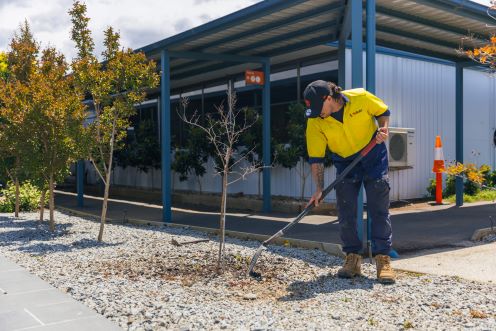Environmental and Sustainable objectives and outcomes
The Victorian Government is working to protect the natural environment. The Framework works alongside other policies, such as Victoria’s Climate Change Strategy, the Recycling Victoria policy and the Recycled First policy to not only avoid the harmful effects of environmental destruction but ensure future Victorians will be able to enjoy their natural surroundings for generations to come. The Framework helps minimise the government’s impacts on the environment and supports Victorians prepare for a safe and prosperous future, even in a changing climate.
Environmentally sustainable outputs
Procuring sustainable outputs can have a wide range of positive impacts on the environment. By requiring government buyers to incorporate into contracts a requirement to use resources sustainably or use recycled content in construction works, the Victorian Government is helping reduce waste, carbon emissions, use of virgin materials, transport costs and impacts, and energy and water use.
There is also a significant opportunity to use alternative or recycled content in construction works to reduce demand on virgin resources without comprising performance. The Victorian Government is moving Victoria to a circular economy and released the State’s Circular Economy Policy called Recycling Victoria in February 2020. A key intent of Recycling Victoria is to optimise the use of recycled and reused Victorian materials in transport infrastructure projects through the Recycled First policy. Road and rail projects provide many opportunities to use recycled content and reduce our reliance on virgin materials.
Working together with delivery partners, several projects delivered by Major Road Projects Victoria, LXRP, the North East Link Program, the West Gate Tunnel Project and Rail Projects Victoria have used recycled or reused materials over the life of these major projects:
Did you know?
If you are looking for products with recycled content, there is a Victorian Government directory to help you find suppliers:
Environmentally sustainable business practices
As one of the largest customers in the market, the Victorian Government is using its purchasing power to drive sustainable practices among its suppliers. The Environmentally sustainable business practices objective applies not only to suppliers’ outputs but to their back-of-house operations. By encouraging suppliers to adopt best-practice industry environmental standards, the Victorian Government is extending the positive environmental impact of its procurement beyond the purchased outputs.
These practices can impact many areas including maximising recycling, minimising waste and greenhouse gas emissions, conserving energy, water and natural resources, minimising habitat destruction and environmental degradation and providing non-toxic solutions and dealing with hazardous substances responsibly.
Implementation of the Climate Change Policy objectives

Climate change poses risks and dangers for generations to come. The Victorian Government is helping mitigate these effects through its procurement.
Government can include project-specific requirements to minimise greenhouse gas emissions. Long-lived, high-carbon structures can lock in increased emissions over many years. The creation of raw materials, the construction phase, and the operation of buildings and infrastructure can all involve the release of large quantities of greenhouse gases.
By enacting requirements throughout the planning, construction and operation phases of these assets, the government is helping Victorians minimise their carbon footprint. These requirements build on the Climate Change Act 2017 and Victoria’s Climate Change Strategy to achieve a target of net-zero by 2050.
Because of their long operating lives, buildings and infrastructure are particularly vulnerable to the long-term impacts of climate change, including sea level rises, changing rainfall patterns and increased temperatures. Accounting for climate change risk when designing buildings and infrastructure can help protect the wellbeing and safety of people and communities who use the assets. It also helps avoid the costs and difficulties of retrofitting existing assets.
Case Study: DELWP and PonyUp for Good
To support the Framework’s objective to achieve positive environmental outcomes through sustainable procurement practices, the Department of Environment, Land, Water, and Planning (DELWP) engaged Telstra and PonyUp for Good and included clauses within the contract for Environmentally Sustainable Business Practices.
When it came to sourcing IT equipment to run emergency management systems, DELWP promoted sustainable business practices by ensuring suppliers complied with relevant industry recognised standards, such as ISO 14001 Environmental Management, AS/ NZS 5377 E-Waste Management System and ISO 9001 Quality Management Systems.
Not only that, but once the equipment was no longer needed, DELWP produced Environmentally Sustainable Outputs by ensuring their decommissioned IT equipment was disposed of in a responsible manner.
DELWP partnered with PonyUp for Good, a female-led social enterprise delivering e-waste sustainability programs to businesses across Australia. They collect donated, decommissioned devices and securely cleanse their data to ensure the technology is diverted from landfill and can be re-used for up to 7 more years. PonyUp for Good donate 50% of their profits to their charity impact partner SecondBite, providing fresh meals to people in need.
Telstra and PonyUp for Good decommissioned server equipment from Next DC offices in Melbourne and Sydney in 2021. As part of this project, 1,180 kilos of technology were diverted from landfill and 100% of the equipment was able to be reused. Alongside the environmental impacts, PonyUp for Good donated 25,668 meals to support vulnerable people during the initial COVID-19 State of Emergency.
For any equipment that is unable to be re-used, PonyUp for Good works with several accredited recycling partners. One of those partners is the Activ Group, which has developed an Environmental Management System (EMS) in line with the internationally recognised standard ISO 14001:2015. The EMS has enabled the Activ Group to manage its operations and services in alignment with its environmental objectives. Through the implementation of the EMS, the Activ Group aims to minimise the use of resources and reduce non-renewable energy consumption, reduce waste through reuse and recycling and work collaboratively with suppliers and contractors to promote sustainable solutions.
Updated

